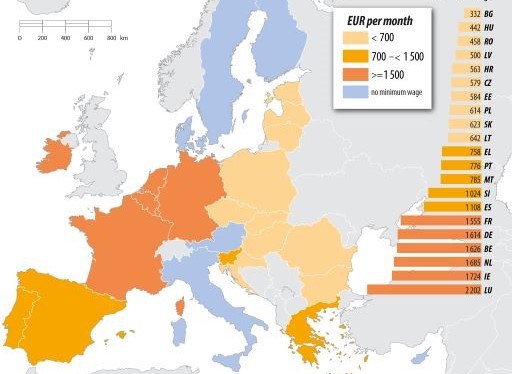The Employment and Social Policy Council reached on Tuesday an agreement on a proposal for a directive on adequate minimum wages aimed at ensuring fair working conditions in the EU.
The agreement paves the way for the next stage in the legislative process, which is political discussions with the European Parliament on an EU directive.
“Decent and fair pay must be ensured for the work done,” said Janez Cigler Kralj, Slovenian Minister of Labour, Family, Social Affairs and Equal Opportunities, who was chairing the Council meeting (6 November). “This is about basic respect for people and their work. The directive is particularly important for the most vulnerable, as it will help to prevent in-work poverty.”
Minimum wages can be ensured by either collective bargaining between employers and trade unions (“the social partners”) or legislation in the form of statutory minimum wages. The Commission proposal risked facing opposition from Sweden and other countries that apply a collective bargaining system.
The Commission gave an assurance when launching a consultation last year that its initiative would aim to ensure that both “well-functioning collective bargaining in wage-setting is in place” and that “national frameworks allow for statutory minimum wages to be set and regularly updated according to clear and stable criteria”.
The Slovenia EU Presidency commented that it had placed considerable focus on the proposal, as one of its priorities was promoting quality work for a quality of life for all generations.
“Negotiations were extremely challenging, requiring as they did the reconciling of the different concerns of EU member states, which questioned the adequacy of the legal basis and did not support major interferences in the systems in place at the national level.”
Asked if she was satisfied with the outcome in the Council, Swedish MEP Heléne Fritzon, S&D group vice-president, told The Brussels Times that Sweden welcomes its general direction. “Sweden wants to safeguard its model. There was a broad majority in the Council to respect different wage setting models. Its proposal is balanced and we hope that it will be respected.”
What’s new in the Council proposal?
In its draft directive, the Council writes that the Commission’s proposal for a directive is aimed at creating four main obligations for member states:
- promote collective bargaining, in particular on wage setting,
- respect a number of procedural obligations, if and when countries set/update statutory minimum wages and assess their adequacy,
- take measures to enhance effective access to minimum wage protection of workers, who are entitled to a minimum wage under national law, and
- collect data and report it to the Commission, in order to monitor the coverage and adequacy of minimum wage protection.
The proposal contains different provisions for statutory minimum wages and those fixed by collective agreements. Therefore, the distinction between these two is crucial, according to the Council.
In article 4 on the promotion of collective bargaining on wage setting, the Council proposes that member states shall establish an action plan to promote collective bargaining where the coverage is below a threshold of 70%.
Article 5 on statutory minimum wages was at the centre of the work with many countries calling for a softening of the obligations and others defending the initial Commission proposal. Following these discussions, some adjustments were made. However, the successive presidencies left the core of the provisions on the promotion of the adequacy of statutory minimum wages untouched.
Considering that minimum wages do not usually change drastically from one year to another, the obligation to report annually was seen as an unnecessary burden by many member states. Therefore, this was changed to reporting every second year.
Member states with statutory minimum wages shall establish the necessary framework for setting and updating the statutory minimum wages, guided by criteria set to promote adequacy with the aim to achieve decent working and living conditions, social cohesion and upward convergence. The criteria will be defined in accordance with their national practices.
In November, the European Council adopted its position on the Commission proposal when it endorsed the mandate agreed by the Employment and Social Affairs Committee with 443 votes in favour, 192 against and 58 abstentions.
M. Apelblat
The Brussels Times

